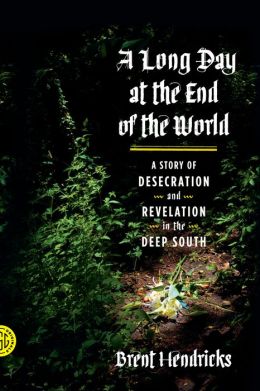In February 2002, hundreds of decayed, abandoned bodies were discovered at the Tri-State Crematory in rural Georgia. It was the largest mass desecration in modern American history. The perpetrator - a well-respected family man and former hometown football star - had managed to conceal the horror for five years.
Among the bodies was that of Brent Hendricks's father. To address the psychic turmoil caused by this discovery, Hendricks embarks on a pilgrimage across the disturbed landscape of the Deep South to the crematory site. In [this book], he reveals the gruesome and bizarre details of the desecration and confronts his fraught relationship with his father - wrestling with the grief surrounding his death as well as the uncanniness of his startling resurrection.
This is one of those little finds across the library desk. A patron returned the book and of course wanted to tell me about it. I thought it sounded like the sort of thing my husband would be interested in (he reads mysteries, true-crime, forensic stuff), so I checked it out and took it home. He read it in no time flat (maybe 48 hours?) and kept telling me about little things here and there. Since it's such a small book, I decided to pick it up myself.
It's interesting, I'll give him (and my patron) that. My biggest problem was that I wanted to know a lot more about Brent Marsh, the man responsible for the 339 bodies that were found on the crematory grounds, left in all sorts of disarray and states of decay. But since Hendricks wrote the book about his journey to see his father's last "resting" place, the story of Marsh is doled out rather sparingly. Granted, Hendricks makes it clear that there's not a lot to know about Marsh; he never gave a reason for his failure to perform his duties. He didn't do it to make money, as the savings per body was rather paltry. Theories run the gamut from laziness to a sort of overworked-snowball-type thing, where he got behind on his crematory duties and started to dump a body here, a body there, perhaps planning to catch up later, but of course, never able to get the upper hand on the situation. And much like an office worker who gets behind on paperwork, then starts hiding it to hide the fact that he/she is behind, the theory goes that Marsh dumped more and more bodies.
I'd be very interested in reading more about one theory Hendricks talks about, that of hoarding. One psychologist proposed that Marsh was, in essence, exhibiting hoarding tendencies with his acres of bodies. And while it sounds plausible, one has to wonder why he would only hoard a portion of the bodies he received for cremation; he still performed over 600 some cremations during the 5 years or so that this was going on. Why keep some but not others? And if one is hoarding bodies, why? The only people I've ever read about keeping bodies as such have all been serial murderers. These people were already dead when Marsh received them.
Perhaps the best theory is that Brent Marsh had to go into the family business, but it was about the last thing he wanted to do. He simply did not want the job. And maybe that's why he did what he did - he just hated his job. We'll never know, and the reader definitely doesn't learn much more from this book. Hendricks talks mostly about his journey across the South, about his childhood, about the reason his father came to "rest" at Tri-State, and how biblical it all is to him, the son. His father was displaced from his original home by a flood (one to create a lake and dam), and after he died, he was buried in the ground. Hendricks's mother, however, had a growing phobia regarding burial, and after some years, had her husband exhumed so that she could have him cremated. I know - how ironic that he should end up at Tri-State, suffering a fate, one would imagine, much worse than mere burial.
As I said, it's an interesting subject. And while I would recommend the book merely for that reason, be prepared - the author gets extremely philosophical, and tends to repeat himself. It does make me wonder if anyone wrote anything on just the Tri-State Crematory desecration itself. Time to do some digging, if you'll pardon the pun!

No comments:
Post a Comment